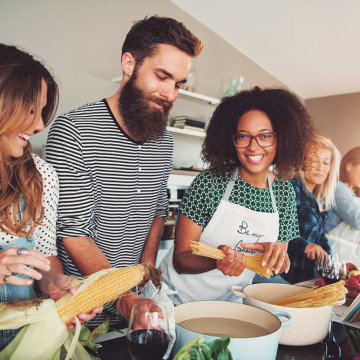

Year 12 Food Studies Units 3 and 4
Overview
Unit 3 Food in Daily Life
In this unit you will investigate the many roles and everyday influences of food.
Why do we eat food? Area of Study 1 explores the science of food: our physical need for it and how it nourishes and sometimes harms our bodies. You will also investigate the science of food appreciation, the physiology of eating and digestion, and the role of diet on gut health.
Area of Study 2 focuses on influences on food choices: how communities, families and individuals change their eating patterns over time and how our food values and behaviours develop within social environments. Have you ever thought about what we eat today and how it is very different to what your parents and grandparents ate? You will investigate food trends; for example, why we are eating more exotic meals and less ‘meat and three veg’. You will look at why the food you eat makes you the person you are and connects you to others. Practical activities (cooking) will enable you to understand how to plan and prepare food to cater for various dietary needs. You will produce nutritious (and hopefully successful) everyday meals and practice a range of food preparation skills.
Unit 4 Food Issues, Challenges and Futures
How do you know whether to trust everything you hear and read about food? In Area of Study 1, you will learn more about how to respond to food information. Then you will develop the skills and knowledge you need to work out what information to believe and what to reject. You will use the knowledge and skills to assess a range of food fads, trends and diets. Once again, you will produce healthy recipes based on the Australian Dietary Guidelines and the Australian Guide to Healthy Eating.
Worried about food waste, excessive food miles and unethical treatment of animals? Or perhaps you are concerned about single use food packaging, unfair treatment of food workers or whether or not people in Australia and around the world have enough to eat? In Area of Study 2, you will focus on issues about the environment, climate, ecology, ethics, farming practices, including the use and management of water and land, the development and application of innovations and technologies, and the challenges of food security, food sovereignty, food safety and food wastage. You will then select an issue that you are really interested in and research and report on the issue. This includes looking at what can be done to reduce any impact on our environment, animals and people.
Who is it for?
This is a great subject for you if you want to know more about how food and diet can keep you and your family healthy. The subject allows you to apply your knowledge in a practical environment, so you get to break up study time with cooking!
So, if you are planning on studying health and nutrition in the future or you are thinking about pursuing a hospitality course, this subject can help you develop some important skills and knowledge to take forward into further study or a relevant career.
What do you do?
- Sensory and Product Analysis
- cook different recipes
- develop evidence of practical work
- taste Tests
- develop menus and recipes to meet certain dietary needs
- modify and substitute ingredients
- contribute to class discussions.
What skills do you need?
You will need to know how to read and produce a recipe and to perform basic food preparation skills. It would be great if you have had some cooking experience but it will not be a problem if you have not.
You will need to be self-motivated, organised and enthusiastic. Sometimes you might need to find your own information and recipes to complete learning activities so you will need to have good research skills in order to find the information you need.
From time to time, you will be asked a question about a food related topic. You need to be able to say what your opinion is and explain why you have that opinion. If you already have some knowledge about basic nutrition, that would be helpful, but not necessary.
What skills do you develop?
- organisation in the kitchen
- basic food preparation skills
- how to use food preparation tools and equipment safely
- research skills
- cooking a range of different recipes
- the ability to identify, analyse, explain and compare a range of food-based information from websites, TV shows or social media. You will learn how to validate the information you are presented with.
- the ability to read and apply the Australian Dietary Guidelines and the Australian Guide to Healthy Eating.
Requirements
Mobile phone or digital device to photograph production work:
- You are required to buy the ingredients required for your food productions
- You need regular access to a kitchen with a range of appliances and utensils.
- Optional texts for Unit 3 and 4 Food Studies are-
- Heath, G., McKenzie, H. and Tully, L., Food Solutions – Food Studies Units 3 and 4, Fifth Edition, Nelson, South Melbourne, 2022.
Note: The text book is not mandatory. However, as a VCE student you should be completing wider reading and consulting a range of resources. This is why the text is recommended. The textbook also includes a range of review questions and revision activities that students can complete as additional work to prepare for School-assessed Coursework’s and the end of year exam. However, if you do not wish to purchase the textbook you can complete the course without it.
Things to think about
This subject is called ‘Food Studies’ because it is more about the study of food rather than the preparation of it. You will plan and prepare food three to four times per unit, but cooking is just one of the many different types of activities you will complete in this subject. The other activities include written work and other practical activities such as taste tests and comparing products.
Practical work is a small component of VCE Food Studies. It is much more ‘academic’ than the previous ‘Food and Technology’ where practical work and the production of a hamper or folio was the main focus. As an academic VCE subject, you’ll find that you will need to be just as organised and committed for Food Studies as you would be for any other VCE subject. You can expect to spend five to six hours a week on Food Studies, just like you would for any Unit 3 and 4 Mathematics, English or Science subject.
Things you can do now
Be familiar with what you can do to use tools and equipment safely in the kitchen.
Familiarise yourself with a range of food preparation techniques and how to perform them.
Familiarise yourself with the Australian Dietary Guidelines and the Australian Guide to Healthy Eating.
Have a basic understanding of the main nutrients, their role and the foods that provide these nutrients.
Look at some recent food trends of social media
Go to the VCAA website for more information about this subject.
Things to have a look at
Australian Dietary Guidelines
Information about the Australian Dietary guidelines and advice about the amount and kinds of foods that we need to eat for health and wellbeing.